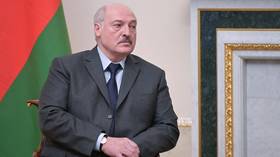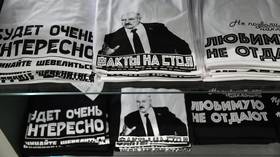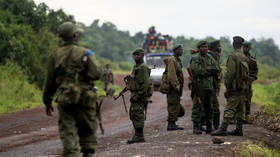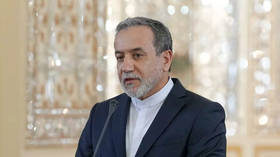Lukashenko makes God claim

Belarus’ embattled leader Alexander Lukashenko received divine intervention to take his country’s top job almost three decades ago and continues to have the backing of a higher power in governing the Eastern European nation today, the bombastic politician has claimed.
Speaking in an exclusive interview aired on Monday, the president of the former Soviet Republic set out his theological views and gave an unorthodox answer as to what passport his deity is likely to carry.
According to Lukashenko, God is not only Belarusian “today,” but has been for decades. “He threw me into that frying pan in the mid-90s,” the leader said, a reference to his accession to power in 1994. “He still helps me now and then.”
The strongman has raised eyebrows in recent weeks with a series of remarks about the country’s governance. In late January, Lukashenko joked that he is “a dictator” and that democracy is a hard concept for him to grasp.
His remarks come a year and a half on from a hotly disputed presidential election that saw tens of thousands of people take to the streets in the aftermath to demand a fresh vote, after the long-term leader was declared a victor in a landslide. International observers and the opposition insist that the 2020 election was rigged. Several protesters are reported to have died, with most anti-government activist figures either now detained or in exile.
Lukashenko argued that his understanding of democracy is quite different from the version espoused by “the free world and the bastion of democracy – the US.”
“Democracy is the rule of the people. The referendum is an element of democracy,” Lukashenko added, referring to an upcoming public vote on proposed sweeping constitutional changes, scheduled for late February. Analysts, however, have cautioned that amendments to the country’s founding document could pave the way for the veteran official to maintain his grip on power.
Minsk unveiled its proposed new constitution in late December, which, if approved, would introduce term limits for presidents, restricting them to two five-year stints in office. However, this only applies to “newly elected” leaders, which could potentially allow Lukashenko to stay in power for another decade after his current term ends in 2025.The revisions are said to empower the so-called All-Belarusian People’s Assembly, which is currently a general meeting of the Belarusian government with top officials and industry leaders held every five years. Opposition figure Svetlana Tikhanovskaya, who has sought the support of Western nations from her exile in Lithuania, insists that she is the rightful victor in the 2020 election and claims that the revisions will enable Lukashenko to “secure power [and] control the situation through the artificial All-Belarusian People's Assembly.”
The EU has refused to recognize the legitimacy of the presidential election in 2020, dubbing it neither free nor fair, and later imposed restrictive measures against individuals “identified as responsible for [the] repression and intimidation against peaceful demonstrators, opposition members and journalists … as well as for misconduct of the electoral process.”













